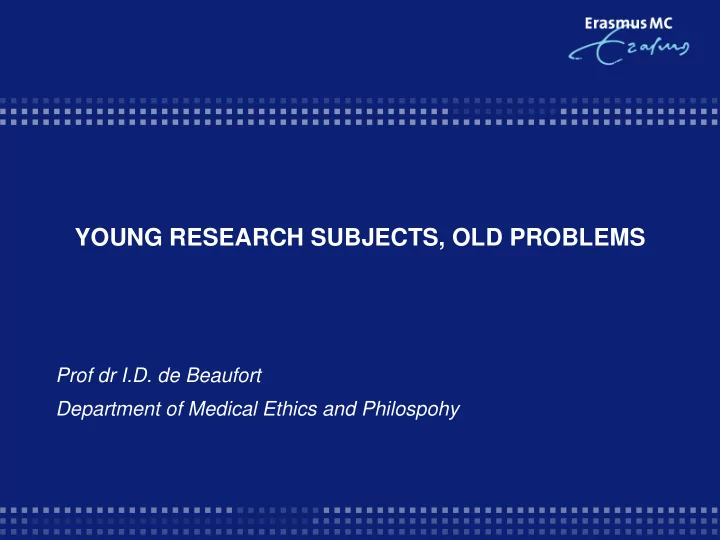

YOUNG RESEARCH SUBJECTS, OLD PROBLEMS Prof dr I.D. de Beaufort Department of Medical Ethics and Philospohy
“To experiment on children in ways that are not related to them as patients is already a sanitized form of barbarism which pays no attention to the faithfulness-claims which a child, simply by being a normal or a sick or a dying child, places upon us and medical care.”
Balancing between non-maleficence, dignity, beneficence and solidarity
To use (off-label) treatments on children that have not been subject of research is, prima facie, unethical.
NON-THERAPEUTIC PROCEDURES OR TRIALS
MINIMAL RISK AND MINIMAL BURDEN
What is minimal risk and minimal inconvenience/ burden Should exceptions be allowed and when? No exceptions should be allowed as a matter of principle Too difficult to decide when and which exceptions should be allowed A slippery slope
A minor increase over minimal risk
Stretching the notion of benefit and therapeutic
It is therapeutic in a moral sense.
- It is taking a rain check on the future - It may justify too much! - Children need not be ‘mini Samaritans’
We recommend Europe to adopt a policy that is more closely related to the two factors that determine when exceptions to the minimal risk and burden can be justified: the assent of the research subjects and the value of the study.
Very Important Research VIR
For a study to be exceptionally valuable, the desired data much be truly indispensable for improving medical care for children.
Strict scientific standards
The assent of the child
A ‘NATIONAL’ APPROACH
ATTENTION FOR ETHICAL REVIEW TOURISM
CHILDRENS VIEWS AND EXPERIENCES
Focus groups with pediatricians, parents and children may be helpful.
AWARENESS OF OTHER GROUPS OF PATIENTS
Recommend
More recommend